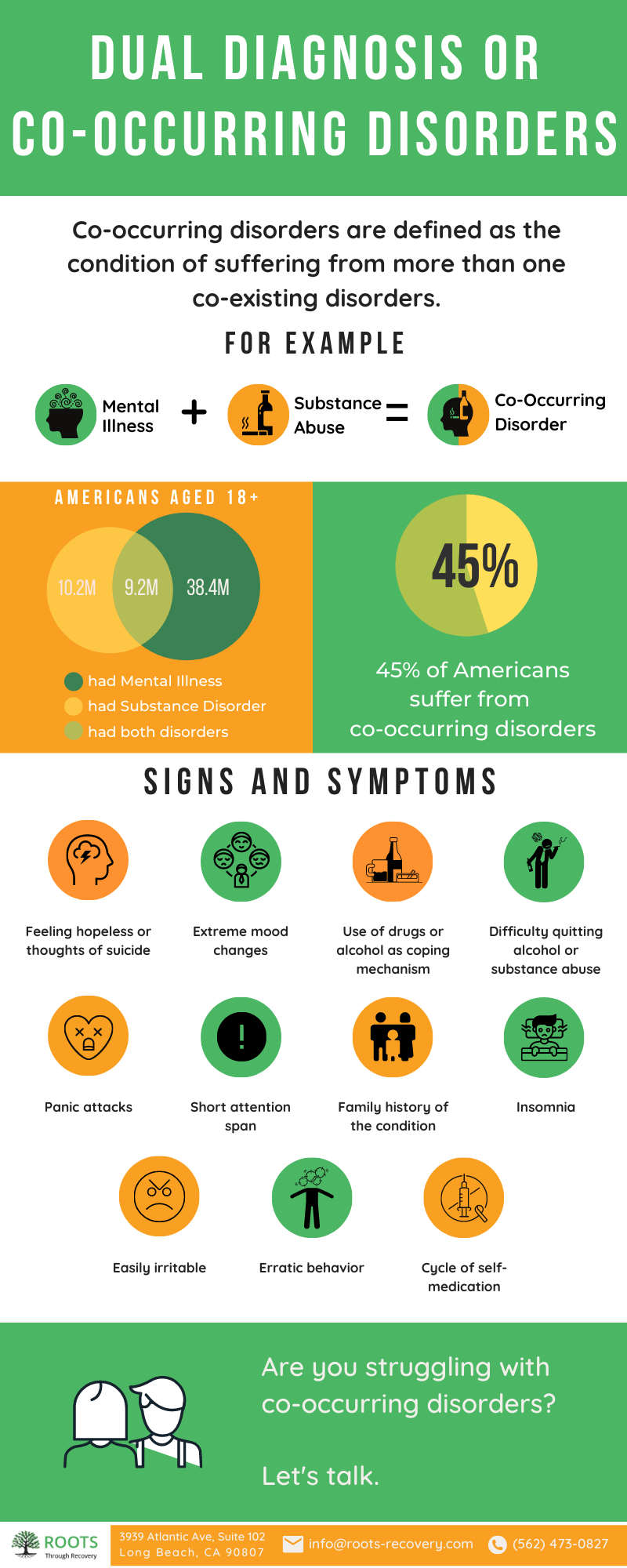
Co-Occurring Disorders
What is it?
Co-occurring disorders are defined as the condition of suffering from more than one co-existing disorders, such as suffering from depression and alcohol abuse, or pain and opioid dependence. Previously called “dual-diagnosis”, co-occurring disorders are the most accurate way to describe the comorbidity of multiple conditions. Many of the individuals who seek treatment at Roots Through Recovery suffer from co-occurring disorders such as poly-substance abuse, trauma, chronic pain, and other mental health issues.
What are the possible effects?
People with such disorders can suffer from the following effects:
- Decline in work performance and attendance
- Job loss and ongoing unemployment
- Financial problems
- Homelessness
- Interrogated by police as the result of overdose
- Social withdrawal or isolation
- Antisocial behavior
- Self-harming or suicidal tendencies
- Family problems
- Infections and physical health problems
- Violence
What are the signs and symptoms?
Anxiety, depression, or bipolar disorder
Extreme mood changes
Use of drugs or alcohol as coping mechanism
Difficulty quitting alcohol or substance abuse
Panic attacks
Short attention span
Family history of addiction or mental health illness
Insomnia
Easily irritable
Erratic behavior
Cycle of self-medication
FAQs
Q: How is dual diagnosis different from co-occurring?
A: The biggest flaw of the term “dual-diagnosis” was its limitation of having two conditions only. In reality, those who seek higher levels of care have more than just two disorders interacting with each other which is why it is more accurate to use the term “co-occurring disorder.”
Q: How are my addiction and mental health problems connected to each other?
A: In most cases, what connects both issues is your cycle of self-medication to deal with your mental issues temporarily. This triggers the onset of your dependency on substances because your body gradually normalizes its need for drugs or alcohol.
Q: How will Roots treat my co-occurring disorders? Will you treat my disorders separately or together?
A: In the infancy of treatment it was believed that treating one disorder at a time was the most effective, but because co-occurring disorders are so enmeshed with each other it is nearly impossible to treat each disorder individually. Roots is aware of this, and our staff are trained in using modalities that effectively treat your co-occurring disorders together.
Q: How come my self-medication from a trauma developed into a co-occurring disorder?
A: What was initially your way to self-medicate from the trauma typically devolves into a way for you to re-traumatize yourself and make symptoms exponentially more intense. Similarly with depression and anxiety, a substance may initially provide some relief but over time it perpetuates the very feeling that you are wishing to alleviate.
Q: Why is it important that I get help?
A: It is important for you to get help because you deserve to have the life you want. We understand that having co-occurring disorders can heavily disrupt your day to day activities. Roots can help you effectively manage co-occurring disorders so that they do not interfere with your daily and long-term goals.
Take the First Step Now
If you need to find a place that feels comfortable and supportive, let Roots Through Recovery’s experienced clinicians and case management team work with you to help determine your next steps. We want you to have choices that will give you and your loved ones the best outcomes.



